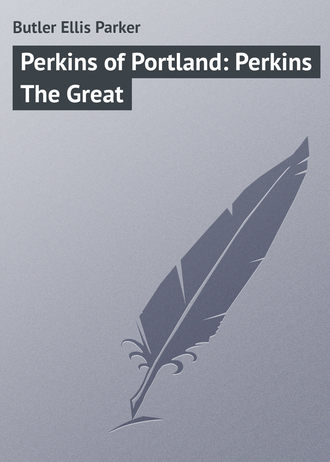 полная версия
полная версияPerkins of Portland: Perkins The Great
The West was just beginning to realize the desirability of having lop-eared guinea-pigs at the moment when lop-eared guinea-pigs were on the point of becoming as extinct as the dodo and mastodon. In a day or two they became totally extinct, and the lop-eared Andalusian guinea-pig existed no more. Silas Boggs wept.
But his tears did not wash away the constantly increasing heaps of orders. He ordered Perkins to withdraw his advertisement, but still the orders continued to come, and Silas Boggs, assisted by a corps of young, but industrious, ladies, began returning to the eager West the beautiful blue money-orders; and, if anything sends a pang through a man’s breast, it is to be obliged to return a money-order uncashed.
By the end of the month the incoming orders had dwindled to a few thousand daily – about as many as Silas Boggs and his assistants could return. By the end of the next month they had begun to make noticeable inroads in the accumulated piles of orders; and in two months more the floor was clear, and the arriving orders had fallen to a mere dribble of ten or twelve a day, but the hair of Silas Boggs had turned gray, and his face was old and wan.
Silas Boggs gave away all his guinea-pigs – the sight of them brought on something like a fit. He could not even bear to see a lettuce leaf or cabbage-head. He will walk three blocks to avoid passing an animal store, for fear he might see a guinea-pig in the window. Only a few days ago I was praising a certain man to him, and happened to quote the line from Burns, —
“Rank is but the guinea’s stamp,”
but when I came to the word “guinea,” I saw Silas Boggs turn pale, and put his hand to his forehead.
But he cannot escape the results of his injudicious advertising, even at this day, so many years after. From time to time some one in the West will unpack a trunk that has stood for years in some garret, and espying a faded newspaper laid in the bottom of the trunk, will glance at it curiously, see the advertisement of the lop-eared Andalusian guinea-pigs, and send Silas Boggs ten dollars.
For an advertisement, like sin, does not end with the day, but goes on and on, down the mighty corridors of time, and, like the hall-boy in a hotel, awakes the sleeping, and calls them to catch a train that, sometimes, has long since gone, just as the lop-eared Andalusians have gone.
III. THE ADVENTURE OF THE LAME AND THE HALT
I HAD not seen Perkins for over two years, when one day he opened my office door, and stuck his head in. I did not see his face at first, but I recognized the hat. It was the same hat he had worn two years before, when he put the celebrated Perkins’s Patent Porous Plaster on the market.
“Pratt’s Hats Air the Hair.” You will remember the advertisement. It was on all the bill-boards. It was Perkins, Perkins of Portland, Perkins the Great, who conceived the rhyme that sold millions of the hats; and Perkins was a believer in advertising and things advertised. So he wore a Pratt hat. That was one of Perkins’s foibles. He believed in the things he advertised.
“Get next to a thing,” he would say. “Study it, learn to love it, use it – then you will know how to boom it. Take Murdock’s Soap. Perkins of Portland boomed it. He bought a cake. Used it. Used it on his hands, on his face, on his feet. Bought another cake – washed his cotton socks, washed his silk tie, washed his woollen underwear. Bought another cake – shaved with it, shampooed with it, ate it. Yes, sir, ate it! Pure soap – no adulteration. No taste of rosin, cottonseed – no taste of anything but soap, and lots of that. Spit out lather for a month! Every time I sneezed I blew a big soap-bubble – perspired little soap-bubbles. Tasted soap for a year! Result? Greatest ad. of the nineteenth century. ‘Murdock’s Soap is pure soap. If you don’t believe it, bite it.’ Picture of a nigger biting a cake of soap on every billboard in U. S. A. Live niggers in all the grocery windows biting cakes of Murdock’s Soap. Result? Five hundred thousand tons of Murdock’s sold the first year. I use no other.” And so, from his “Go-lightly” shoes to his Pratt’s hat, Perkins was a relic of bygone favorites in dress. The result was comical, but it was Perkins; and I sprang from my chair and grasped his hand.
“Perkins!” I cried.
He raised his free hand with a restraining motion, and I noticed his fingers protruded from the tips of the glove.
“Say,” he said, still standing on my threshold, “have you a little time?”
I glanced at my watch. I had twenty minutes before I must catch my train.
“I’ll give you ten minutes,” I said.
“Not enough,” said Perkins. “I want a year. But I’ll take ten minutes on account. Owe me the rest!”
He turned and beckoned into the hall, and a small boy appeared carrying a very large glass demijohn. Perkins placed the demijohn on a chair, and stood back gazing at it admiringly.
“Great, isn’t it?” he asked. “Biggest demijohn made. Heavy as lead! Fine shape, fine size! But, say – read that!”
I bent down and read. The label said: “Onotowatishika Water. Bottled at the spring. Perkins & Co., Glaubus, Ia.”
I began spelling out the name by syllables, “O – no – to – wat – ” when Perkins clapped me on the back.
“Great, hey? Can’t pronounce it? Nobody can. Great idea. Got old Hunyadi Janos water knocked into a cocked hat. Hardest mineral water name on earth. Who invented it? I did. Perkins of Portland. There’s money in that name. Dead loads of money. Everybody that can’t pronounce it will want it, and nobody can pronounce it – everybody’ll want it. Must have it. Will weep for it. But that isn’t the best!”
“No?” I inquired.
“No!” shouted Perkins. “I should say ‘no!’ Look at that bottle. Look at the size of it. Look at the weight of it Awful, isn’t it? Staggers the brain of man to think of carrying that across the continent! Nature recoils, the muscles ache. It is vast, it is immovable, it is mighty. Say!”
Perkins grasped me by the coat-sleeve, and drew me toward him. He whispered excitedly.
“Great idea! O-no-to-what-you-may-call-it water. Big jug full. Jug too blamed big. Yes? Freight too much. Yes? Listen – ‘Perkins Pays the Freight!’”
He sat down suddenly, and beamed upon me joyfully.
The advertising possibilities of the thing impressed me immediately. Who could resist the temptation of getting such a monstrous package of glassware by freight free of charge? I saw the effect of a life-size reproduction of the bottle on the bill-boards with “Perkins Pays the Freight” beneath it in red, and the long name in a semicircle of yellow letters above it. I saw it reduced in the magazine pages, in street-cars – everywhere.
“Great?” queried Perkins.
“Yes,” I admitted thoughtfully, “it is great.”
He was at my side in an instant.
“Wonderful effect of difficulty overcome on the human mind!” he bubbled. “Take a precipice. People look over, shudder, turn away. Put in a shoot-the-chutes. People fight to get the next turn to slide down. Same idea. People don’t want O-no-to-thing-um-bob water. Hold on, ‘Perkins pays the freight!’ All right, send us a demijohn!”
I saw that Perkins was, as usual, right.
“Very well,” I said, “what do you want me to do about it?”
Perkins wanted a year of my time, and all the money I could spare. He mentioned twenty thousand dollars as a little beginning – a sort of starter, as he put it. I had faith in Perkins, but twenty thousand was a large sum to put into a thing on the strength of a name and a phrase. I settled myself in my chair, and Perkins put his feet up on my desk. He always could talk better when his feet were tilted up. Perhaps it sent a greater flow of blood to his brain.
“Now about the water?” I asked comfortably.
“Vile!” cackled Perkins, gleefully. “Perfectly vile! It is the worst you ever tasted. You know the sulphur-spring taste? Sort of bad-egg aroma? Well, this O-no-to-so-forth water is worse than the worst. It’s a bonanza! Say! It’s sulphur water with a touch of garlic.” He reached into his pocket, and brought out a flask. The water it contained was as clear and sparkling as crystal. He removed the cork, and handed the flask to me. I sniffed at it, and hastily replaced the cork.
Perkins grinned with pleasure.
“Fierce, isn’t it?” he asked. “Smells as if it ought to cure, don’t it? Got the real old style matery-medica-’pothecary-shop aroma. None of your little-pill, sugar-coated business about O-no-to-cetera water. Not for a minute! It’s the good old quinine, ipecac, calomel, know-when-you’re-taking-dose sort. Why, say! Any man that takes a dose of that water has got to feel better. He deserves to feel better.”
I sniffed at the flask again, and resolutely returned it to Perkins.
“Yes,” I admitted, “it has the full legal allowance of smell. There’s no doubt about it being a medicinal water. Nobody would mistake it for a table water, Perkins. A child would know it wasn’t meant for perfume; but what is it good for? What will it cure?”
Perkins tilted his Pratt hat over one ear, and crossed his legs.
“Speaking as one Chicago man to another,” he said slowly, “what do you think of rheumatism?”
“If you want me to speak as man to man, Perkins,” I replied, “I may say that rheumatism is a mighty uncomfortable disease.”
“It’s prevalent,” said Perkins, eagerly. “It’s the most prevalent disease on the map. The rich must have it; the poorest can afford it; the young and the old simply roll in it! Why, man,” he exclaimed, “rheumatism was made ‘specially for O-no-to-so-forth water. There’s millions and millions of cases of rheumatism, and there’s oceans and oceans of Perkins’s World-Famous O-no-to-what-you-call-it water. Great? What will cure rheumatism? Nothing! What will O-no-to-so-on water cure? Nothing! There you are! They fit each other like a foot in a shoe.”
He leaned back, and smiled. Then he waved his hand jauntily in the air.
“But I’m not partial,” he added. “If you can think of a better disease, we’ll cure it. Anything!”
“Perkins,” I said, “would you take this water for rheumatism?”
“Would I? Say! If I had rheumatism I’d live on it. I’d drink it by the gallon. I’d bathe in it – ”
He stopped abruptly, and a smile broke forth at one corner of his mouth, and gradually spread over his face until it broke into a broad grin, which he vainly endeavored to stifle.
“Warm!” he murmured, and then his grin broadened a little, and he muttered – “Lukewarm!” – and grinned again, and ran his hand through his hair. He sat down and slapped his knee.
“Say!” he cried, “Greatest idea yet! I’m a benefactor! Think of the poor old people trying to drink that stuff! Think of them trying to force it down their throats! It would be a sin to make a dog drink it!”
He wiped an actual tear from his eye.
“What if I had to drink it! What if my poor old mother had to drink it! Cruelty! But we won’t make ‘em. We will be good! We will be generous! We will be great! We will let them bathe in it. Twice a day! Morning and night! Lukewarm! Why make weak human beings swallow it? And besides, they’ll need more! Think of enough O-no-to-so-forth water to swim in twice a day, and good old Perkins paying the freight!”
Without another word I reached over and clasped Perkins by the hand. It was a silent communion of souls – of the souls of two live, up-to-date Chicagoans. When the clasp was loosened, we were bound together in a noble purpose to supply O-no-to-something water to a waiting, pain-cursed world. We were banded together like good Samaritans to supply a remedy to the lame and the halt. And Perkins paying the freight.
Then Perkins gave me the details. There were to be three of us in the deal. There was a young man from Glaubus, Ia., in Chicago, running a street-car on the North Side. He had been raised near Glaubus, and his father had owned a farm; but the old man was no financier, and sold off the place bit by bit, until all that was left was a forty-acre swamp, – “Skunk Swamp,” they called it, because of the rank water, – and when the old man died, the son came to Chicago to earn a living. He brought along a flask of the swamp water, so that when he got homesick, he could take out the cork, smell it, and be glad he was in Chicago, instead of on the old place. Up in the corner of the swamp a spring welled up; and that spring spouted Onotowatishika water day and night, gallons, and barrels, and floods of it.
But it needed a Perkins the Great to know its value. Perkins smelled its value the first whiff he got. He had a rough map of Glaubus with the Skunk Swamp off about a mile to the west.
We patched up the deal the next day. The young fellow was to have a quarter-interest, because he put in the forty acres, and Perkins put in his time and talent for half the balance; and I got the remainder for my time and money. We wanted the young fellow to take a third interest, and put in his time, too; but he said that rather than go back to the old place, he would take a smaller share, and get a job in some nice sweet spot, like the stock-yards or a fertilizer factory. So Perkins and I packed up, and went out to Glaubus.
When we got within two miles of Glaubus, Perkins stuck his head out of the car window, and drew it back, covered with smiles.
“Smell it?” he asked. “Great! You can smell it way out here! Wait till we get on the ground! It must be wonderful!”
I did not wonder, when the train pulled up at the Glaubus Station, that the place was a small, dilapidated village, nor that the inhabitants wore a care-worn, hopeless expression. There was too much Onoto-watishika water in the air. But Perkins glowed with joy.
“Smell it?” he asked eagerly. “Great ‘ad.!’ You can’t get away from it. You can’t forget it. And look at this town. Look at the bare walls! Not a sign on any of them! Not a bill-board in the place! Not an ‘ad.’ of any kind in sight! Perkins, my boy, this is heaven for you! This is pie and nuts!”
I must confess that I was not so joyous over the prospect. I began to tire of Ono-towatishika water already. I suggested to Perkins that we ought to have an agency in Chicago, and hinted that I knew all about running agencies properly; but he said I would get used to the odor presently, and in time come to love it and long for it when I was away from it. I told him that doubtless he was right, but that I thought it would do me good to go away before my love got too violent. But Perkins never could see a joke, and it was wasted on him. He walked me right out to the swamp, and stood there an hour just watching the water bubble up. It seemed to do him good.
There was no shanty in the village good enough for our office, so that afternoon we bought a vacant lot next to the post-office for five dollars, and arranged to have a building put up for our use; and then, as there was nothing else for us to do, until the next train came along, Perkins sat around thinking. And something always happened when Perkins thought.
In less than an hour Perkins set off to find the mayor and the councilmen and a notary public. He had a great idea.
They had a park in Glaubus, – a full block of weeds and rank growth, – and Perkins showed the mayor what a disgrace that park was to a town of the size and beauty of Glaubus. He said there ought to be a fountain and walks and benches where people could sit in the evenings. The mayor allowed that was so, but didn’t see where the cash was to come from.
Perkins told him. Here we are, he said, two public-spirited men come over from Chicago to bottle up the old skunk spring, and make Glaubus famous. Glaubus was to be our home, and already we had contracted for a beautiful one-story building, with a dashboard front, to make it look like two stories. If Glaubus treated us right, we would treat Glaubus right. Didn’t the mayor want to help along his city?
The mayor certainly did, if he didn’t have to pay out nothin’.
All right, then, Perkins said, there was that old Skunk Swamp. We were going to bottle up a lot of the water that came out of the spring and ship it away; and that would help to clean the air, for the less water, the less smell. All Perkins wanted was to have those forty acres of swamp that we owned plotted as town lots, and taken in as the Glaubus Land and Improvement Company’s Addition to the town of Glaubus. It would cost the village nothing; and, as fast as Perkins got rid of the lots, the village could assess taxes on them, and the taxes would pay for the park.
The mayor and the council didn’t see but what that was a square deal, so they called a special meeting right there; and in half an hour we had the whole thing under way.
“But, Perky,” I said, when we were on the train hurrying back to Chicago, “how are you going to sell those lots? They are nothing but mud and water, and no sane man would even think of paying money for them. Why, if the lot next the post-office is worth five dollars, those lots a mile away from it, and ten feet deep in mud, wouldn’t be worth two copper cents.”
“Sell?” said Perkins, sticking his hands deep into the pockets of his celebrated “Baffin Bay” pants. “Sell? Who wants to sell? We’ll give ‘em away! What does the public want? Something for nothing! What does it covet? Real estate! All right, we give ‘em real estate for nothing! A lot in the Glaubus Land and Improvement Company’s Addition to the town of Glaubus free for ten labels soaked from O-no-to-thing-um-bob water bottles. Send in your labels, and get a real deed for the lot, with a red seal on it. And Perkins pays the freight!”
Did it go? Does anything that Perkins the Great puts his soul into go? It went with a rush. We looked up the rheumatism statistics of the United States, and, wherever there was a rheumatism district, we billed the barns and fences. We sent circulars and “follow-up” letters, and advertised in local and county papers. We shipped the water by single demijohns at first, and then in half-dozen crates, and then in car-lots. We established depots in the big business centres, and took up magazine advertising on a big scale. Wherever man met man, the catchwords, “Perkins pays the freight,” were bandied to and fro. “How can you afford a new hat?” “Oh, ‘Perkins pays the freight’!”
The comic papers made jokes about it, the daily papers made cartoons about it, no vaudeville sketch was complete without a reference to Perkins paying the freight, and the comic opera hit of the year was the one in which six jolly girls clinked champagne glasses while singing the song ending:
“To us no pleasure lost is,And we go a merry gait;We don’t care what the cost is,For Perkins pays the freight.”As for testimonials, we scooped in twenty-four members of Congress, eight famous operatic stars, eighty-eight ministers, and dead loads of others.
And our lots in the Glaubus Land and Improvement Company’s Addition to the town of Glaubus? We began by giving full-sized dwelling-house lots. Then we cut it down to business-lot size; and, as the labels kept pouring in, we reduced the lots to cemetery lot size. We had lot owners in Alaska, Mexico, and the Philippines; and the village of Glaubus fixed up its park, and even paved the main street with taxes. Whenever a lot owner refused to pay his taxes, the deed was cancelled; and we split the lot up into smaller lots, and distributed them to new label savers.
We also sent agents to organize Rheumatism Clubs in the large cities. That was Perkins’s greatest idea, but it was too great.
One morning as Perkins was opening the mail, he paused with a letter open before him, and let his jaw drop. I walked over and laid my hand on his shoulder.
“What is it, Perky?” I asked.
He lay back in his chair, and gazed at me blankly. Then he spoke.
“The lame and the halt,” he murmured. “They are coming. They are coming here. Read it?”
He pushed the letter toward me feebly. It was from the corresponding secretary of the Grand Rapids Rheumatic Club. It said:
“Gentlemen: – The members of the club have used Onotowatishika water for over a year, and are delighted to testify to its merits. In fact, we have used so much that each member now owns several lots in the Glaubus Land and Improvement Company’s Addition to the town of Glaubus; and, feeling that our health depends on the constant and unremitting use of your healing waters, we have decided as a whole to emigrate to Glaubus, where we may be near the source of the waters, and secure them as they arise bubbling from the bosom of Mother Earth. We have withheld this pleasant knowledge from you until we had completed our arrangements for deserting Grand Rapids, in order that the news might come to you as a grateful surprise. We have read in your circulars of the beautiful and natural advantages of Glaubus, and particularly of the charm of the Glaubus Land and Improvement Company’s Addition to the town of Glaubus, and we will come prepared to rear homes on the land which has been allotted to us. We leave to-day.”
I looked at Perkins. He had wilted.
“Perky,” I said, “cheer up. It’s nothing to be sad about. But I feel that I have been overworking. I’m going to take a vacation. I’m going to Chicago, and I’m going to-day; but you can stay and reap the reward of their gratitude. I am only a secondary person. You are their benefactor.”
Perkins didn’t take my remarks in the spirit in which they were meant. He jumped up and slammed his desk-lid, and locked it, banged the door of the safe, and, grabbing his Pratt hat, crushed it on his head. He gave one quick glance around the office, another at the clock, and bolted for the door. I saw that he was right. The train was due in two minutes; and it was the train from Chicago on which the Grand Rapids Rheumatic Club would arrive.
When we reached the station, the train was just pulling in; and, as we jumped aboard, the Grand Rapids delegation disembarked. Some had crutches and some had canes, some limped and some did not seem to be disabled. In fact, a good many seemed to be odiously able-bodied; and there was one who looked like a retired coal-heaver.
It was beautiful to see them sniffing the air as they stepped from the train. They were like a lot of children on the morning of circus day.
They gathered on the station platform, and gave their club yell; and then one enthusiastic old gentleman jumped upon a box and shouted: —
“What’s the matter with Perkins?”
The club, by their loudly unanimous reply, signified that Perkins was all right But as I looked in the face of Perkins the Great, I felt that I could have given a more correct answer. I knew what was the matter with Perkins. He wanted to get away from the vulgar throng. He wanted that train to pull out And it did.
As we passed out of the town limits, we heard the Grand Rapids Rheumatic Club proclaiming in unison that Perkins was —
“First in peace! First in war! First in the hearts of his countrymen!”But that was before they visited their real estate holdings.
IV. THE ADVENTURE OF THE FIFTH STREET CHURCH
AFTER that Glaubus affair, I did not see Perkins for nearly a year. He was spending his money somewhere, but I knew he would turn up when it was gone; and one day he entered my office hard up, but enthusiastic.
“Ah,” I said, as soon as I saw the glow in his eyes, “you have another good thing? Am I in it?”
“In it?” he cried. “Of course, you’re in it! Does Perkins of Portland ever forget his friend? Never! Sooner will the public forget that ‘Pratt’s Hats Air the Hair,’ as made immortal by Perkins the Great! Sooner will the world forget that ‘Dill’s Pills Cure All Ills,’ as taught by Perkins!”
“Is it a very good thing, this time?” I asked.
“Good thing?” he asked. “Say! Is the soul a good thing? Is a man’s right hand a good thing? You know it! Well, then, Perkins has fathomed the soul of the great U. S. A. He has studied the American man. He has watched the American woman. He has discovered the mighty lever that heaves this glorious nation onward in its triumphant course.”
“I know,” I said, “you are going to start a correspondence school of some sort.”
Perkins sniffed contemptuously.
“Wait!” he cried imperiously.
“See the old world crumbling to decay! See the U. S. A. flying to the front in a gold-painted horseless band-wagon! Why does America triumph? What is the cause and symbol of her success? What is mightier than the sword, than the pen, than the Gatling gun? What is it that is in every hand in America; that opens the good things of the world for rich and poor, for young and old, for one and all?”









